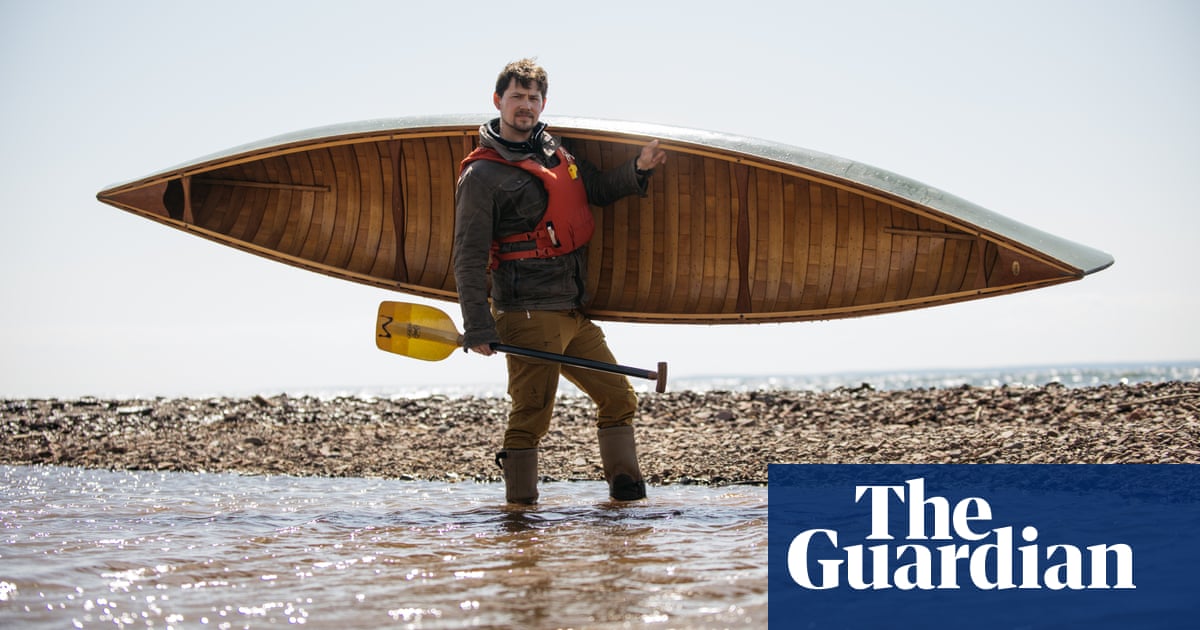
Late one afternoon, on what was supposed to be a six-week white-water canoe trip through the Canadian wilderness, 17-year-old Alex Messenger left his campsite to climb a steep ridge that promised panoramic views of the tundra. It was the highest point for at least 50 miles. “You could see lake after lake, after lake,” he says. Then, directly across the ridge, Messenger saw something else – a flicker of brown. His body recognised it before his conscious mind did. “It triggered all of the physiological responses in a fraction of a second,” he says, “before I even realised it was a grizzly bear.”
Four weeks earlier, in July 2005, Messenger’s group of six had set out on their summer adventure from Lake Wholdaia, in the remote Canadian Northwest Territories. They had been told that they would be lucky even to see a bear. “I felt like I had a good appreciation of what risks we were likely to encounter,” Messenger says. “Top of my mind was flipping the boat, and other things that can happen in white water.”
Finding himself face to face with a 600lb grizzly bear had not crossed his mind. Now, with the predator just 30ft away, Messenger felt his airways enlarge, his adrenaline spike and his pulse double, preparing his body to flee, fight or hide. The bear seemed to be making a similarly rapid assessment. It was on all fours, wide-eyed and clearly startled. “It was like we’d stumbled upon each other, and both had the reaction: ‘What am I looking at?’” says Messenger.
Messenger wanted to run. Instead, he says, “I fell back on my training.” He started slowly backing away, speaking in a low voice, keeping his eyes averted, trying desperately to persuade the bear that he was not to be feared. But the bear wasn’t convinced. Grunting and growling, it launched towards Messenger, one or two steps at a time, as if it was testing him.
The distance between them was shrinking rapidly, even as Messenger was edging away. “I knew that I couldn’t run – but I wasn’t really sure what to do at that point,” he says (the bear deterrents the group had packed were back at the campsite). Then the bear charged. Despite their immense bulk, bears can run at close to 40mph. When it was 15ft away, Messenger could feel the ground shaking under its paws.
He yelled for help, knowing that no one could hear him. Then, instinctively, he threw his 15lb camera case at the animal galloping towards him – and hit it square on its snout. The strike was forceful enough to turn the bear’s head, allowing Messenger to jump out of its path.
“As soon as it realised that it had missed me, it turned around and came at me again.” Even in the moment, he remembers being struck by its agility. “I’ve never seen anything move as quickly as that bear.” The other thing that registered above his terror was the smell – “like a dog that had never been bathed”.
For excruciating seconds, bear and boy circled each other, “bullfighting style”, says Messenger – but with each round, the circle grew tighter. The bear was snapping and swiping at Messenger, who took a glancing blow to the shoulder, then another across his back. But, just as he had dodged its jaws, the bear reached up with its forepaws. The blow across Messenger’s face could have felled a caribou or musk ox, the bear’s typical prey. “I felt like a mosquito getting swatted,” he says. “My head went to the side, then I went flying.”
Mid-air, he realised there was no way that he could outsmart or outmanoeuvre his opponent. “There was nothing physically that I could do: you’ve got a 150lb 17-year-old versus a 600lb grizzly bear,” he says. “I just realised that, you know … I was about to die.” He pauses. “And it was a terrible feeling.”
As soon as Messenger landed, hard, on his tailbone, the bear was upon him. Its head was right above his hip joint, its jaws around his leg. “I felt those teeth go in on both sides, and blacked out from the pain,” he says. He doesn’t know how long he was unconscious: “I was playing dead very effectively.”
When he came to, the bear was loping quickly in the other direction. Having eliminated the threat, it seemingly wanted to make a quick getaway. Still playing dead, Messenger watched it disappear over the edge of the rise, then took his chance. He set out in what he hoped was the direction of the camp, his surging adrenaline just about overpowering the growing heat of his right thigh. “The whole time I was waiting for the bear to come back and finish the job,” he says.
He staggered 150 yards or so to the lip of the ridge, his right leg now screaming, his trouser leg sticky with blood, and yelled down to the campsite: “Bear!” Below, his friends reacted with disbelief. They were in a bug-proof communal tent, making pizzas for dinner.
Messenger had been unlucky to run into the bear and even less lucky to be attacked by it. Just 44 attacks by grizzly bears are reported globally each year, with 12 of them taking place in North America. Most are nonfatal.
He estimates now, on a video call from his home in Duluth, Minnesota, that the time between stumbling across the bear and losing consciousness was 30-60 seconds. “It was super-short, but it had ripple effects through the rest of my life,” he says. Lying there on the hill, powerful images of loved ones flashed through his mind in quick succession.
The group’s 27-year-old guide, Dan, had some emergency responder training and he carried out an initial assessment. Messenger’s right leg had been in the bear’s jaws, causing a deep puncture to his thigh and four more compression wounds elsewhere. He had claw marks across his back, around one ankle and to an earlobe, and the beginnings of a black eye where the bear had struck him. At some point, the tips of two of his toes had been sliced clean off: he has no recollection of how that happened.
The group was more than 100 miles from the closest settlement – but, after their base camp was consulted via satellite phone, an emergency evacuation by plane was deemed too logistically challenging. While Messenger could not walk, he could paddle, so the group resolved to continue along the route towards what had been their intended destination, the tiny settlement of Baker Lake in the Arctic territory of Nunavut, remaining in close contact with experts by phone and monitoring Messenger day and night for signs of infection.
Damage to Messenger’s muscle tissue had slowed the flow of blood to his wounds and Dan was tasked with regularly reopening his wounds and flushing them by syringe. Messenger recalls the excruciating pain, and biting down on his leather-covered multitool to cope. The group’s stores of ibuprofen had to be carefully rationed, but for Messenger there was some comfort in putting his fate in the hands of his teammates. “It can be hard to let go, but I think it’s a really important step … It helps to bring some peace and remove stress.”
With Messenger only able to paddle with reduced mobility, and sometimes having to encounter white water, the group made slow and often painful progress. But, he says, being able to contribute was a “really good feeling”. “That I was able to assist in my own rescue was empowering and cathartic for me … I had this mindset of ‘OK, what do we have to do next?’”
As long as Messenger remained stable, the priority was getting him a rabies shot within 12 days of the attack. But, after a gruelling five-day passage, his wounds started showing signs of infection. Dan improvised his first-ever surgery, cutting out the dying tissue – “like trying to cut through the tough parts of raw chicken”, says Messenger.
Nevertheless, the infection continued to spread. Now that they were closer to the settlement at Baker Lake and helicopters were available, the call was made to evacuate the patient. It was decided that one of the teammates, Mike, would accompany Messenger on his journey, because it was thought that he was less likely to develop post-traumatic stress disorder if he stayed with someone he knew. Ironically, Messenger recalls, Mike was the one who had persuaded him to come on the trip, when he had been wavering over the cost. “I’m still thankful that he did,” he says. “Really – it was just such an amazing experience, even if it didn’t quite go as we planned.”
At Baker Lake, Messenger received 12 hours of intravenous antibiotics, before being flown south to Winnipeg for the first of five rabies shots. His parents drove through the night from the family home in Minnesota to pick him up. For six weeks, he took oral antibiotics and followed a programme of wound care management. Two months after the attack, the puncture on his right thigh had healed. He regained full motion a year later through personal training. “I was incredibly lucky,” he says. “To see me, no one would have any idea what had happened.”
That has proved its own burden. There is no support group for survivors of bear attacks, because, as Messenger says, there aren’t enough of them. “I recognised pretty early on that it would be hard to find people who would relate.” Even before they were evacuated, Messenger had told Mike that he almost wished for claw marks on his arm, some sign of what he’d been through. “It’s like this impostor syndrome: people are going to think that I’m making it up.” When most people hear about Messenger’s story, he says, their first reaction is to look him up and down.
The toll proved to be mostly psychological. For the first few weeks after the attack, Messenger had flashbacks and would wake up in the night, convinced a bear was right next to him. Even almost 20 years later, Messenger, who is now 35, remains easily startled. When he is out hiking, and a twig snaps, “I instantly go into a full-blown fight-or-flight response”. Dogs in particular can be triggering. But, through meditation and breathwork, he has been able to gain greater control over those bodily responses.
Learning about bears and why they attack also helped him to process the trauma. “When you have a trauma, regardless of what it is, if you’re able to understand it, that can be a big step towards healing,” he says. “It’s taking this thing that your brain can’t figure out and compartmentalising it, so that it’s not just going to jump out at you.” Messenger also drew comfort from researching what he could have done differently, in case he should ever be unlucky enough to stumble across a bear again. “It’s things as simple as not going out alone, and making a noise when you’re coming up to a blind spot, that are going to dramatically decrease the chances of this happening again.”
A few years ago, he returned to grizzly country, visiting the Glacier National Park in Montana with friends. They carried bear spray – “religiously”, he says.
Today, Messenger talks knowledgeably about bear behaviour in a way that belies his first-hand experience. His only response while watching Leonardo DiCaprio’s character get mauled by a bear in the 2015 film The Revenant was to think: “That bear is not moving like my bear did.” Messenger’s was a “classic defensive encounter,” he says, meaning that the bear was motivated only by the desire to eliminate threat, not by the need for food – which, he says, would be what is known as a “predacious encounter – and a whole other level of horrifying”.
But, although Messenger might have mastered intellectually what happened to him, for some years he struggled to find the meaning of it. “I’ve always felt that there’s perhaps some kind of purpose tied around this whole experience. I don’t know what that is, but it feels like there was a little bit more at play than what we can see and touch.” For years, “I was waiting for an ‘Aha!’ moment that would tie it all up for me,” he says. “That never happened.”
Eventually, he joined his local volunteer wilderness search-and-rescue team, using his experience to help others. Writing a book about his experience was also therapeutic: “I realised I could spend my entire life waiting to find out what the purpose was – it was time to tell the story. I didn’t need to tell people what it meant: they could take their own meaning from it.”
In his day-by-day account of the journey, Messenger carries the reader along with him to replicate a singular experience that can transform a life. “Everything changes once you get there – and everything changes once you leave.”












